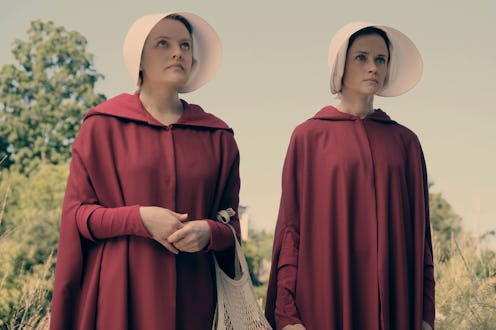Entertainment
'The Handmaid's Tale' Will Make You See Alexis Bledel Differently

It's hardly surprising that we'd be prone to associating Alexis Bledel Rory Gilmore, one of her most well-known roles to date. For years, Gilmore Girls was Bledel's main bread and butter. While fans have conflated the actor with her character for years, that's all about to change thanks to Bledel's role as Ofglen in The Handmaid's Tale. Ofglen will permanently tear down those pristine, comparatively chaste visions of Rory that we have stuck in our brains. Bledel is finally Rory no more. And it's about time.
Spoilers for The Handmaid's Tale ahead. It becomes immediately clear from the moment you meet Bledel's Ofglen that something is different about her. She appears to be just another law-abiding, Scripture-quoting Handmaid, but you can tell there's more going on with her than meets the eye. When she and her companion, Offred (the protagonist of The Handmaid's Tale), stop and look in a shop window, she recalls it was an ice cream shop once. Telling Offred that their salted caramel was better than sex — good sex, mind you — it's clear to viewers there more to Ofglen than meets the eye. This sexually-charged salted caramel moment is definitely not something Rory Gilmore would ever say and boy, does that shift feel good.
These emerging differences between Ofglen and Rory come down to how we have always viewed Bledel versus how we will view her after we watch The Handmaid's Tale. Ofglen is going to forever change Bledel's actorly persona, moving her away from that Rory Gilmore-ified vibe and into more adult, transgressive territory. Make no mistake: this is a good thing. Where Rory was highly independent, academic, and somewhat sheltered in her upbringing, Ofglen is exposed to patriarchal repression at its worst, forced to survive within the parameters of a theocratic and conservative political regime. In short, Ofglen and Rory couldn't be more different.
For the most part, Bledel's played it safe in her acting choices over the years. Her previous credits have typically been "pure" women (Lena in Sisterhood of the Traveling Pants), idealistic women (Rory in Gilmore Girls), or women who are safe from the corrupting influence of maturity (Winnie Foster in Tuck Everlasting). When Bledel has gone against these types, it's way against type: roles in Mad Men, Sin City, The Kate Logan Affair, and Violet & Daisy have all pitched us a version of Bledel who is willing to push our preconceived notions of her as an actor.
Ofglen is another step towards watching a more adult Bledel bloom onscreen. Anger, pain, rebelliousness, and sexuality — all things her darker work has the roles like perfect Rory Gilmore do not — come together to create Ofglen. After The Handmaid's Tale, the scales will tip Bledel firmly into darker territory.
Ofglen is parrying threats from all sides in The Handmaid's Tale. Through her, we learn there's a rebellion covertly fighting against the repressive government of the Republic of Gilead. We get to watch Bledel sink her acting teeth into a profane character (she gets to drop a few F-bombs), a woman who is sexually subversive (at one point she grabs the crotch of a prison guard), and isn't afraid to rebel against authority. Stars Hollow's most famous teen will seem like a dream after watching Ofglen wade through the hellscape of life in a theocratic regime.
Watching her work with material that is intrinsically feminist and queer further distances us (in the best way possible) from that Rory Gilmore image. At one point, Ofglen is revealed to be a lesbian, or what's known as a "gender traitor" in The Handmaid's Tale. When her secret relationship with a Martha (a household servant) is discovered, it is Ofglen's brutal punishment that pushes Bledel into new acting territory. This show's specifically horrific treatment of LGBTQ characters put Ofglen in the crosshairs.
This insight into Gilead's treatment of queer women is more chilling when connected back to very real events in the American LGBTQ community. We most likely know women like Ofglen: Women who have been targeted for their sexual identity. Women who have been reduced down to the sum of their body parts rather than the content of their minds. Women who are subjected to governmental decrees without any consultation.
Bledel — who is, as far as we know, a cisgender, heterosexual woman — must do the emotional work of living as a persecuted citizen, like those men and women living in America today facing this unimaginable scrutiny. That Bledel must, as an actor, sink into this headspace and channel these very real and tangible emotion pushes her further away from the unflappable, overachieving, privileged Gilmore Girls image and into some meaningful territory.
We know that The Handmaid's Tale is undoubtedly feminist. We know that it is instructive, jarring, rebellious, and all kinds of similarly progressive adjectives. It would behoove us to understand why this is the way the cookie crumbles. If we're going to steep ourselves in a show that is, as HuffPost calls it, "a master class in the power of rebellion," we should understand that it's Ofglen (and Bledel in turn) teaching the class. Performances like the very necessary and eye-opening one Bledel turned in have the ability to signal a paradigm shift for an actor. Any whiff of sweetness or innocence associated with Rory Gilmore that we carried into The Handmaid's Tale is stamped out by Oflgen.
This Handmaid might change how you view a variety of issues and people — queer women, female agency, equal rights among all genders and sexualities, the state of democracy in America — and she will definitely change how you see Bledel.